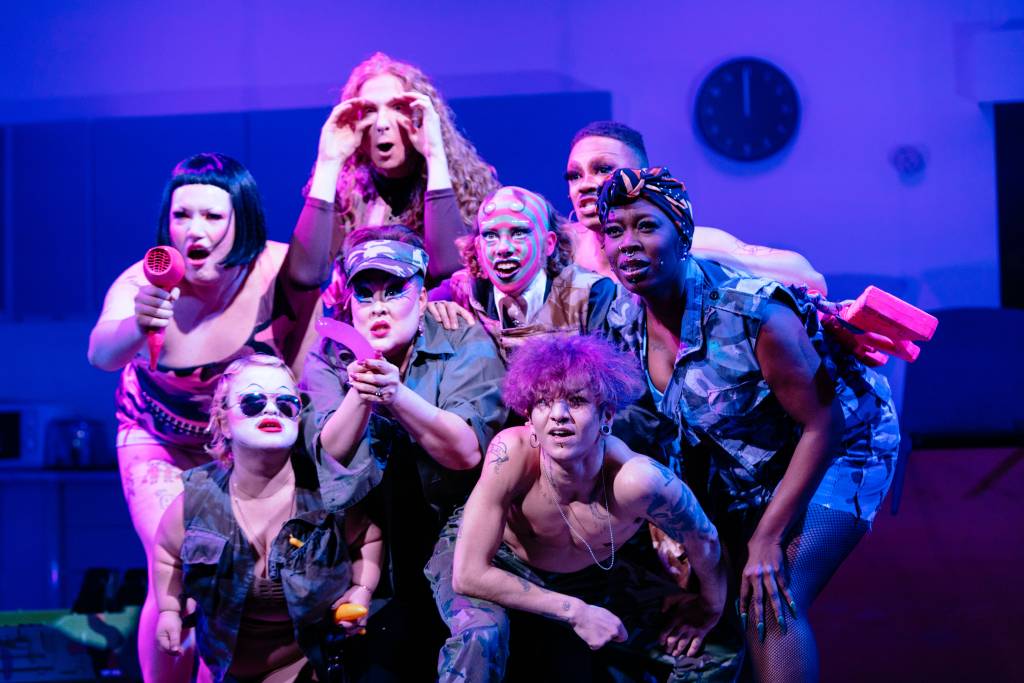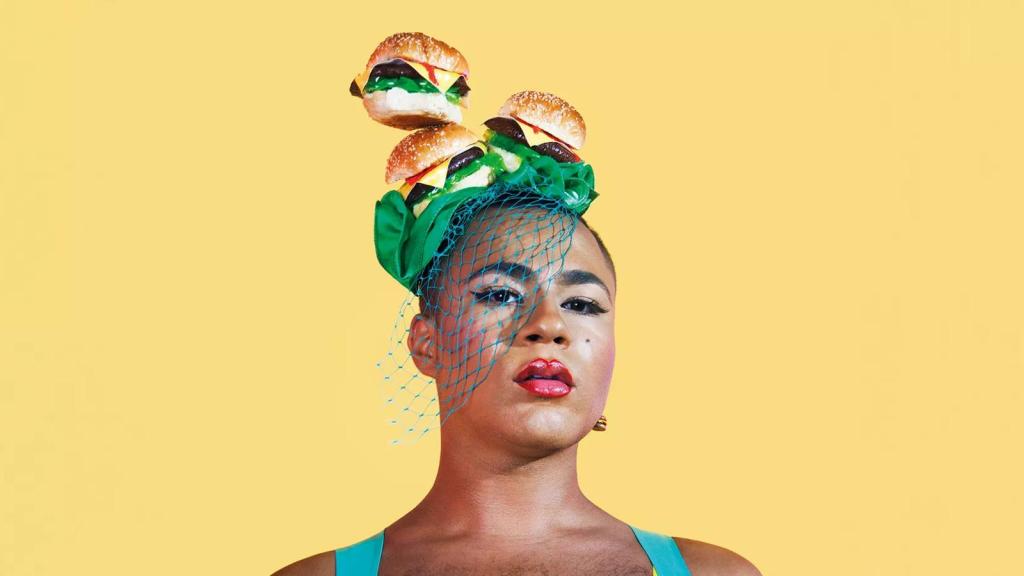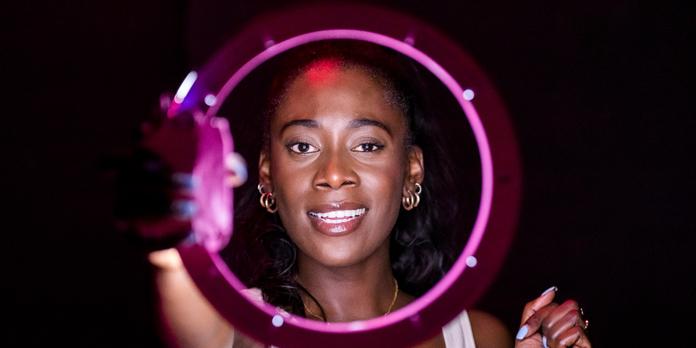Fola’s Top Shows of 2023
Among the 30-odd plays I watched in 2023 (sadly less than I watched last year) were some which left such lasting impressions on me I have no choice but to highlight them in an end-of-year round-up.
Sound of the Underground, Royal Court Theatre

Performer and theatre-maker Travis Alabanza created two pieces of art which have both made my list – Sound of the Underground at the Royal Court Theatre being the first that I watched. In this electrifying and explosive play, Alabanza and co-creator and director Debbie Hannan spotlights London’s underground queer clubbing scene, which has at its epicentre, transgressive art and (often poorly paid) artists. We’re treated to an evening of drag, cabaret, and burlesque as the ensemble (CHIYO, Lilly SnatchDragon, Ms Sharon Le Grand, Sadie Sinner The Songbird, Rhys’ Pieces, Sue Gives A F*ck, Midgitte Bardot, and Wet Mess) perform with equal measures of joy and vulnerability. All this explodes out of the initial plotline in which they conspire to kidnap RuPaul, whose popular franchise ‘RuPaul’s Drag Race’ has resulted in the commercialisation of their beloved fringe artform. These legendary drag queens and creatives, under Alabanza’s and Hannan’s tutelage, craft a play that defies categorisation, balancing the desire to give the audience the night out that we paid for while reckoning with how much of their artistic expression is threatened when it becomes ‘labour’. An exhilarating metatextual play which draws parallels to Alabanza’s Burgerz…
Burgerz, Southbank Centre

A show that I wouldn’t, as with Sound of the Underground, classify as simply ‘theatre’. Alabanza and their creative team have again resisted any one traditional method of storytelling, instead offering us – in the form of a cooking and stand-up comedy show – a mirror into which we must look and interrogate our own societal presumptions and prejudices. If anything, Burgerz is an immersive exhibition on identity, transphobia, and on the audience themselves. Directed by Sam Curtis Lindsay, this production begins with Alabanza inviting a cis, white, straight man to volunteer to read aloud instructions on how to cook a burger for Alabanza on stage. We learn about this audience member’s relationship to his identity and to identity politics at large. As Alabanza continues to cook the burger, we get to a moment – a formative one for them and for us – when they recount being the victim of a hate crime; someone threw a burger at them for simply walking down the street as a trans person. With this memory, Alabanza invites us to question the many times in our lives we’ve been a bystander, watched violence enacted with a silence tantamount to complicity, all because it’s easier than speaking up. I hope to see more of Alabanza’s necessary and cathartic explorations about nonconformity and survival in the new year and beyond.
The Swell, Orange Tree Theatre

Shortlisted for the 2020 Women’s Prize for Playwriting, Isley Lynn’s non-linear play about three lesbians – fiances Annie and Bel, and Annie’s childhood friend, Flo – is animated by a nimble cast: Jessica Clark, Ruby Crepin-Glyne, Viss Elliot Safavi, Saroja-Lily Ratnavel, Shuna Snow and Sophie Ward. With Annie’s unexpected arrival in their lives, the soon-to-be-weds’ bliss quickly becomes exposed as a kind of naivety and gives way to darker revelations and confessions. This ensemble, each of whom are either playing the young or old versions of Annie, Bel, and Flo, is a powerhouse who adds a lived texture to Lynn’s poetic narrative. The Swell is principally a love-triangle, a web of competing passions which entangles all three women over several decades. Never confusing or alienating, Hannah Hauer-King’s production keeps us suspended in a perpetual uncertainty, much as each relationship hangs precariously in the balance. The haunting inevitability of this story is given extra weight as the cast turn into a kind of Greek chorus whenever they’re not actively on stage. The tragedy culminates with a twist that is delivered effortlessly on a stage that resembles a boxing ring the more and more things become combative. Each audience member may have their favourites in a uniformly great cast – and while I was particularly drawn to Clark’s performance, the real testament is this original piece of writing which allows for all pillars of theatre making – from the direction and staging to the sound design – to come together in a spell-binding exploration of queer desire and betrayal.
The Effect, National Theatre

Verbal volleying, sharp soliloquies, incisive retorts – Lucy Prebble’s dialogue in The Effect remains as idiosyncratic as it did in 2012, and yet, with the popularity of HBO’s Succession, for which Prebble writes, it also feels oddly familiar. With no real specificity of period and location, and yet gesturing to a grey-and-blue tinged, mist-filled dystopian future, Jamie Lloyd’s revival for the National Theatre feels as stripped back as possible, with the focus solidly on the psychologies of its two principal characters, Tristan (Paapa Essiedu) and Connie (Taylor Russell). These two could not be more different and yet have found their paths converge at this clinical trial for an experimental antidepressant. During the trial, the two patients fall in love which is a side-effect of the drug – but the dynamics keep shifting between them as they debate who’s been administered the placebo and whose feelings are chemically-induced. Essiedu and Russell deliver great performances in this play of two halves – on the other side of the traverse staging unspools the layered relationship between the experiment’s two doctors, played by Michele Austin and Kobna Holdbrook-Smith. Admittedly, I cannot say what in the plot has been updated eleven years on but there’s something timelessly mesmerising about Austin’s character as she considers life as a Black woman who has experienced depression, the necessity of antidepressants in a society that nurtures mental instability, feeling like a piece in a larger machine that churns and churns and churns – and what to do with all of this self-awareness. I came away wishing that I could have been given more insight into her character but the sparseness of this play – the questions it throws out and chooses not to dwell on – allows for the audience to fill in the gaps with their own realities. This makes for a borderline uncomfortable viewing experience as we have no choice but to grapple with the complexities of our lives much like the play’s cast. And so, the ensemble’s thoughts, feelings, and darkest secrets are offered to us like we are the psychologists for the play itself, making prognoses and drawing our own conclusions while fighting the impulse to become too entangled.
FLIP!, Soho Theatre

Racheal Ofori’s satire about friendship, social media, and cancel culture is directed by Emily Aboud at breakneck speed and yet never loses sight of its main targets – bedfellows capitalism and fame, and the lengths we must go to remain afloat in a disposable world. With sprightly physical comedy, Leah St Luce and Jadesola Odunjo play content-creating duo Carleen and Crystal. They end up selling out to a new social media platform, FLIP!, and coin a bite-sized and easily-remixable reaction meme – “collect the cheque”. St Luce and Odunjo intermittently act out some of this viral hit among others, which are genuinely funny and highlight both actors’ magnetic personalities. This production is kept lean with St Luce and Odunjo also multi-rolling the voices of their adoring followers and fiercest critics as their characters enter down a Machievallean pursuit for money and views. A morality lesson of sorts, we’re shown how the two women learn very different lessons from the consequences of their actions. With its Tik-Tok-esque dances, musical intervals, and vibrant lighting, this play is emboldened by the very thing it is critiquing – an insightful meta-commentary on how to keep the attention of modern audiences who now lose interest after six seconds. Ofori also explores the ramifications of AI and complicated race relations in a digital age. And yet, as dark as the two characters’ stories become, we never feel the burden of the themes and ideas being thrown out at us.
